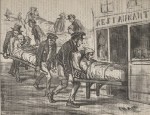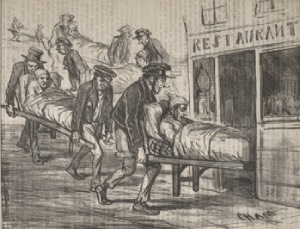
 Banquet de la Société végétarienne anglaise, Le Charivari, 16 novembre 1853, Gallica.
Banquet de la Société végétarienne anglaise, Le Charivari, 16 novembre 1853, Gallica.
As the promoters of vegetarianism remind us at the end of the 19th century, vegetarianism can boast of ancient origins such as the “Pythagorean diet” based on the rejection of the meat diet but, also, of the interest of thinkers of the Enlightenment. If vegetarianism already exists as a practiced or theorized diet, it is at this time that it is structured as a French-speaking social movement, under the influence of earlier experiences in England, the United States and Germany.
Under the Third Republic, social reformers sought to solve various “social scourges“: depopulation, alcoholism, demoralization, and diseases such as tuberculosis or arthritis, leading, according to them, to a degeneration of the “race“. This weakening of the bodies, and by extension, of the social body, is ascribed to the same cause: the modification of diet of the urban working classes which contain more and more meat and other “stimulant” foods such as coffee or alcohol, thanks to a relative increase in their purchasing power and the change of their living conditions. However, in the eyes of social reformers, the quantitative and qualitative insufficiency of this diet does not allow these classes to rebuild their labour force.
Concerning this reasoning, which links social and medical theory, a vegetarian movement is organized. Anna Kingsford (1846-1888), an English theosophist engaged in the anti-vivisectionist movement, gave it visibility in the French medical field by supporting in 1880 a medical thesis at the Faculty of Paris, entitled De l'alimentation végétale chez l'homme, in which she defends the benefits of vegetarianism. Building on this success, the Paris Vegetarian Society, founded in 1878, saw its membership increase and became known as the Société végétarienne de France. Organized mainly around doctors claiming to be hygienists, it is focused on promoting a «food reform» based on vegetarianism.
In the 1880s, this Society popularized the notion of vegetarianism, notably through publications and a media campaign. Until then, vegetarianism, «barbaric» according to some newspapers, refers to an oddity coming from the German Empire or England, carried by religious sects. After 1880, while vegetarianism continued to be derided, it lost part of its enigmatic dimension and even became a distinctive practice in some affluent social circles.
After having been dormant in the 1890s, the French Vegetarian society was revived in 1899 with the help of the Société végétarienne Belge (Belgian vegetarian society): the francophone movement is transnational. The Society organizes conferences, participates in national and international vegetarian congresses, publishes books on vegetarianism, provides the housewife (or her domestics) with vegetarian menus and recipes. It maintains connections with foreign vegetarian societies, and an International Vegetarian Union was founded in Dresden in 1908. In total, it registered more than 1,700 members between 1899 and 1914.
This movement gave rise to a certain distrust of experimental and curative medicine, then dominant, to which it opposed hygienic and preventive medicine. Distrustful of the pharmacy, it also advocates healing by natural elements such as air, sun and water, integrating into the naturist movement. However, it is not antiscience, quite the contrary. Inspired by theosophy — many of its members are members of theosophical societies — which claims a reconciliation between science and religion, the promoters of vegetarianism intend to base their diet on rational bases in harmony with the laws of nature. In return, the advocated abstinence is supposed to bring benefits for both the mind and the body.
If the French vegetarian movement is structured around the Vegetarian Society up until the Second World War, it is far from being reduced to it. From the first decade of 1900, vegetarians with socialist or anarchist tendencies created their grouping. Thus, Jacques Demarquette founded the Trait d'Union in 1912 to defend a vegetarianism closer to the people. In the libertarian milieu, Sophia Zaïkowska and Georges Butaud defend veganism and organize vegetarian colonies. Other actors, opposed to the Vegetarian Society of France and its “health“ vegetarianism, defend an “ethical“ vegetarianism based on the refusal to kill and the taking into account of animal suffering.
In the legitimation of the current vegetarian movement, these ethical arguments took a place of first order, at the expense of hygienist arguments that were privileged by the Vegetarian Society of France.
Read more in the dictionary : Obesity - Tobacco control
Read the paper in French :Végétarisme
Références:
Arouna P. Ouédraogo, Le végétarisme : esquisse d’histoire sociale. INRA, 1994.
Arnaud Baubérot, Histoire du naturisme : Le mythe du retour à la nature, Rennes, Presses Universitaires Rennes, 2004.
To quote this paper: Alexandra Hondermarck, “Vegetarianism”, in Hervé Guillemain (ed.), DicoPolHiS, Le Mans Université, 2022.